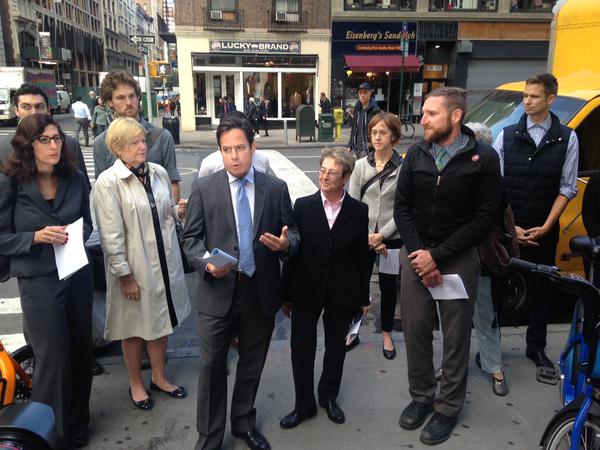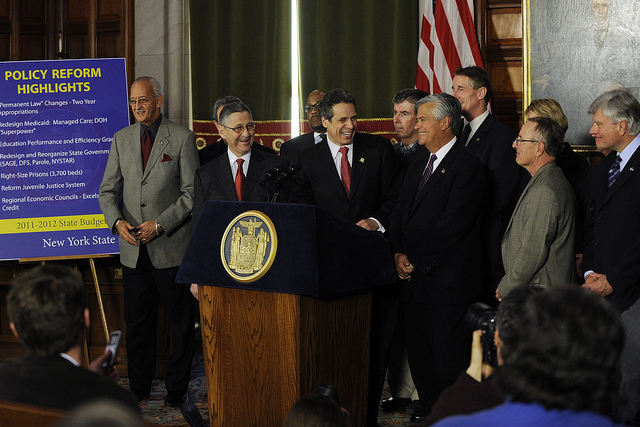Reality TV Has No Place in Emergency Rooms

Council Member Garodnick, the author, at a press conference (photo: @transalt)
It's hard to make a serious argument that we should be filming sick patients in our emergency rooms without their prior written consent. And yet, that is exactly what popular reality television shows like "NY Med" do on a regular basis.
ABC -- which has produced and broadcasted a surprising number of these shows in cities across the country-- has defended this practice, saying that they "have heard many stories of people who were inspired to go to medical school, to become nurses or paramedics, or to head into particular specialties like trauma or transplant surgery, after watching our show." That may be, and the choice to join the medical profession is a noble one, but it should not rely upon the infringement of patients' right to privacy and confidentiality for promotion.
We're not talking about "Grey's Anatomy" here; while reality television shows set in hospitals play on natural human interest in drama, suspense, hope, and loss like scripted shows do, the stories portrayed on these screens are real events happening to people we know, not staged scenes with paid actors.
ABC's NY Med even aired an episode documenting the treatment and eventual death of Mark Chanko, without his consent, to the horror of his wife and children. In 2011, Mr. Chanko was struck by a sanitation truck and was sent to the emergency room at New York Presbyterian Hospital. Mr. Chanko's family not only had to suffer the terrible loss of a husband and father, but three years later, they experienced a brutal and unexpected reminder when they happened to catch the episode and recognize personal details.
In response to concerns raised by members of the New York City Council, privacy advocates, and those moved by the story of the family of Mark Chanko, the Greater New York Hospital Association (GNYHA) on behalf of its members, a few months ago committed to not allowing filming of patients without their prior written consent. This move effectively puts an end to emergency medical reality TV shows in New York City.
Unfortunately, these shows persist in other cities, and patients are being filmed for reality television in Boston, New Orleans, Houston, and emergency rooms across the country. These shows have the same privacy concerns that plagued "NY Med," yet the genre has seen steady growth, and the invasion of privacy has continued unabated, despite calls from medical professionals to shut the shows down.
In fact, the American Medical Association (AMA) in 2001 established guidelines for filming patients for public viewing, which requires that patients give their informed consent prior to being filmed. The AMA Code of Medical Ethics considers filming prior to obtaining a patient's consent to be "a violation of the patient's privacy."
We cannot allow such disregard for patient privacy to continue. Filming patients without consent is both medically and journalistically unethical, and incredibly upsetting for families who have experienced the loss of a loved one.
Elected officials and leaders of medical communities in all media markets should join New York in recognizing that the practice of filming patients for reality television shows without their consent has no place in our emergency rooms.
Personal tragedies are not fodder for reality TV, and American hospitals have a responsibility to put a stop to these invasive shows. I look forward to continuing this conversation with an eye towards reaching all communities whose rights are being violated in the name of entertainment.
***
Dan Garodnick has represented the Fourth District in the New York City Council since 2006, and chairs the Economic Development Committee. On Twitter @DanGarodnick.
***
Have an op-ed for Gotham Gazette? E-mail an idea or a draft to editor Ben Max: This email address is being protected from spambots. You need JavaScript enabled to view it.
Creating the Department of Veterans Services

armed services flags at city hall (photo via @BilldeBlasio)
As we head into Veterans Day, military veterans and their families received historic news last week when the de Blasio administration and the City Council, under the leadership of Speaker Mark-Viverto and Council Member Eric Ulrich, chair of the veterans committee, came to an agreement on creating a new Department of Veterans Services.
This new department will replace the Mayor’s Office of Veterans Affairs (MOVA), creating an agency with more resources better suited to help the city’s large and diverse veterans community find and access resources. New York City will, of course, become the largest municipality in the country to have established an agency solely dedicated to veterans and their family members.
Most importantly, though, creating this new department will ensure that city efforts to help veterans will be properly funded every year, while moving city contracts awarded to local veteran service providers at a quicker pace, instead of through other city agencies more unfamiliar with the community’s needs.
However, this didn’t happen in a vacuum and it took a whole lot of work to accomplish. And, even now that it is happening, there is still much work to do.
From the beginning the administration seemed against the idea of a new department, with MOVA Commissioner Loree Sutton being non-committal on the bill at a hearing in January and Mayor de Blasio stating to reporters: "I have never been convinced that turning an office into a department in any subject matter is really the way to get things done best.”
Their opposition was confirmed in May when Commissioner Sutton wrote a Daily News op-ed in which she came out against the proposal, saying that it would lead to “costly duplication of city services and put the office at a greater remove from City Hall.” Though it was not exactly shocking to see, coming from the commissioner – who is supposed to be the community’s top government “advocate” - this didn’t sit well with the city veterans.
And then came the mayor’s appointment of Veterans Advisory Board members, which set in motion a spring and early summer of disappointment and anger from veterans on a number of issues and led many in the community to believe that there was zero traction on veterans issues at City Hall. However, the administration appeared to make up for these issues in late June when the new fiscal year 2016 budget was approved and veterans saw a significant increase and commitment from the city.
However, by then damage had been done and there was still no new department to help improve resources available to the city’s veterans. Along with that substantive problem, there was also poor messaging on the administration’s part. As the Mayor recently said to the Daily News editorial board, “I think there is a gap between reality and perception and I have to constantly take responsibility. If I got all this product and I’m not making it clear enough to people, of course that’s on me.”
Meanwhile, Council Member Ulrich was whipping votes and continuing his push for the bill – slowly taking the time to move the legislation along by building a coalition of veterans and advocates from throughout the five boroughs, holding hearings on the legislation while working to get other Council members to sign on and, essentially, being patient and flexible with the administration.
The support of Speaker Mark-Viverito was of course key, and with enough sponsors to override a possible de Blasio veto, Council Member Ulrich and his colleagues were able to force the mayor's hand. His decision to back the bill also seems to have come as he eyed Veterans Day and the need to do something significant to show the community he is serious about supporting those who have given so much.
Still, Council Member Ulrich surely negotiated well, and we don’t know what he may have had to offer in order to come to a final deal.
Now, here we are. A historic victory that might possibility be the greatest piece of legislation for veterans in New York City history. But is this the end? No. This new department will change the way we see the city operate in helping veterans and their family members, but there are still many issues to work on, including ensuring that more city contracts are awarded to veteran-owned businesses, for example. And, the new department must be organized and run effectively, helping veterans and their family members access education, health care, and employment resources.
It is essential, of course, that Mayor de Blasio has come around to help make this happen, and we look forward to celebrating with him at the bill-signing. First, we will celebrate with and thank Speaker Mark-Viverito, Council Member Ulrich, the rest of the City Council, and Public Advocate Letitia James.
Elected officials are moving this legislation, with its roots in the advocacy and the service of veterans and our allies. John Rowan, Lee Covino, Paul Narson, Jason Hansman, Oswaldo Pereira, Tireak Tulloch, Paul Rieckhoff, Kristen Rouse, Ryan Graham, Fang Wong, Paul Schottenhamel and Redmond Haskins all contributed significantly to this work and make our community strong.
We also cannot forget Pat Toro and Ed Daniels, who have passed away but were important in making this happen. As with others we have lost, we remember them as we go forward with this work, ensuring that public policy honors the sacrifice made by our military veterans and their families.
***
Joe Bello served 11 years in the U.S. Navy/Naval Reserve and has been a veterans advocate in New York City for two decades. He is the founder of NY MetroVets.
Sheldon Silver Trial Recalls Earlier Legislative Leaders Accused of Corruption

Silver, Cuomo, Skelos (photo: the governor's office on flickr)
The trial of former Assembly Speaker Sheldon Silver has begun in New York City with a federal prosecutor alleging he made $5 million through kickbacks from developers seeking legislative favors and other schemes. "Year after year, Sheldon Silver was on the take," said U.S. Attorney Carrie Cohen, alleging a pattern of "power, greed and corruption." Silver's counsel countered that the former Assembly leader's conduct was "legal and normal." The trial is expected to last six weeks.
Before it is over, former Senate Majority Leader Dean Skelos will go to trial on charges of extortion and soliciting bribes.
The charges facing both men are substantive and serious. Silver's charges carry a potential penalty of 130 years in prison.
Will Silver and Skelos be convicted? If they are, will they be sent to prison? The historical record may give both men cause for hope.
Former Senate Majority Leader Joseph L. Bruno was indicted by federal authorities for wire and mail fraud and other corrupt actions in 2009. Five years of trials, convictions, appeals, and challenges to the constitutionality of the laws that were the basis of prosecution resulted in acquittal. Bruno held a press conference to declare he had been completely exonerated and that the whole thing had been "persecution, not prosecution." New York taxpayers wound up footing most of Bruno's legal bills because state law allows officials to be reimbursed for "reasonable" legal fees if they are acquitted of crimes pertaining to their official duties.
One-time Assembly Speaker Melvin Miller and his law partner were convicted in 1991 of federal charges of cheating legal clients out of some of the profits from investments in cooperative apartments in New York City. The charges were unrelated to Miller's legislative work but the conviction meant automatic expulsion from the legislature. Miller was sentenced to community service which he performed at the Henry Street and University Settlements in New York City, working on mental health and other problems. Two years later, the conviction was overturned on appeal. Miller's actions "may not have been a model of candor and disclosure," the court said, but they did not constitute crimes. Miller decided not to run for office again but continued his legal practice and also worked as a lobbyist.
In 1975, Assembly Speaker Stanley Steingut and his son were indicted on charges that they had promised to assist a donor to the younger Stenigut's campaign for City Council to obtain an unsalaried city job in return for a $2,500 contribution. The exact nature of the position was never clear; press speculation was that it was an honorary deputy police commissioner or unsalaried adviser to the Civilian Complaint Review Board. The Steinguts apparently did not deliver the promised position and the aggrieved donor -- or someone else, it was never entirely clear -- complained to the district attorney. He brought charges under a seldom invoked statue that said an office holder could be charged with "corruptly using" his position in exchange for a benefit, usually cash. It was a shaky case at best.
Steingut denied the accusation and refused to resign as Speaker. Two years later, the Count of Appeals dismissed the indictment on the grounds that there was no evidence of "a materially harmful impact upon governmental processes." Steingut was elated but his vindication led to overconfidence and neglect of politics in his home district. In 1978, he lost his Assembly seat in a primary election.
Then-Assembly Speaker Perry B. Duryea and several others were indicted in 1973 for "vote siphoning." Prosecutors asserted that they set up a phony Liberal Party committee to print and distribute literature for Liberal candidates in marginal legislative districts in order to draw votes away from Democratic candidates, thereby aiding Republicans.
Duryea proclaimed his innocence and refused to step down as Speaker. The next year the charges were dismissed when the section of the election law requiring sponsors of political literature to identify themselves was ruled unconstitutional. Duryea believed the whole thing was a scheme by political opponents to derail his pursuit of the Republican gubernatorial nomination in 1974. Four years later, out from under the cloud of the voting scandal, he secured the nomination but lost the election to Governor Hugh Carey.
Senator Arthur Wicks of Kingston became majority leader in 1949 and, in 1953, also began serving as acting Lieutenant Governor after the incumbent resigned. Press investigative reports that fall disclosed that he had made several visits to Joseph Fay, a labor union leader imprisoned in Sing Sing prison for extortion. Wicks made a paid TV broadcast on Oct. 18, 1953, saying that he had once asked Fay's help "to see that [a union] jurisdictional fight terminated" and other times had asked him "to keep labor peace in my district."
Wicks compared the visits to Fay to the President negotiating with Communist leader Joseph Stalin -- unpleasant but necessary. That analogy didn't wash with Governor Thomas Dewey or most state senators. Wicks was never formally charged with wrongdoing but consulting with a felon at Sing Sing hardly seemed appropriate for one of the state's top officials. Dewey convinced him to resign as majority leader and acting Lieutenant Governor. But he held on to his Senate seat, and was re-elected in 1954.
In 1910, Senator Benn Conger accused Majority Leader Jotham P. Allds of having taken a bribe to kill a piece of legislation back in 1901, when both were serving in the Assembly. Allds proclaimed his innocence, the Senate investigated, and an eyewitness testified that he had seen Allds take a $1,000 bribe in Conger's presence. "I guess it's all right, Conger, it feels good!" Allds had said as he put the envelope with the bribe into his suit pocket. Allds resigned from the Senate just before a vote that had been scheduled to expel him. But he was never prosecuted.
The Senate investigation that unseated Allds also revealed that S. Frederick Nixon, Assembly Speaker from 1899 to 1905 had often taken bribes to advance or kill legislation. He was at the head of a corrupt system of "bill-killing and law-getting," in the words of a contemporary journal article. By 1910, though, Nixon was dead, so only his reputation was tarnished.
History suggests that neither party is more inclined to corruption than the other. Silver, Miller, and Steingut are Democrats; Skelos, Bruno, Duryea, Wicks and Allds, Republicans.
Silver has been speaker since 1994, the second longest tenured speaker in history, and some people have suggested that is too long, leading to arrogance and a sense of entitlement.
The longest tenured Speaker, Oswald D. Heck, a Republican from Schenectady, served from 1937 to 1959, beating Silver by a year. His longevity did not lead to ethics violations or corruption. In fact, he was one of the most effective and upright speakers in state history.
Heck described his political philosophy as "a hard and conservative attitude in economics and a gentle, understanding attitude in human relations." He pressured governors to hold the line on spending but he backed progressive labor and social reforms, including the first state civil rights law in the nation in 1945. The principles he espoused -- cost efficient but responsive government, bi-partisan approaches, and alignment of politics behind the public good -- are still good models. This suggests that longevity in a legislative leadership position does not necessarily result in lapsing into political corruption.
The case against Silver will turn on whether prosecutors can produce and explain evidence that the ex-speaker's maneuverings and deals rose to the level of criminal activities rather than an extreme form of routine Albany deal-making politics. "There are two sides to every story, and we haven't heard [Silver's] side" yet, wrote Mel Miller in a Wall Street Journal op-ed column earlier this year. That story is about to pour out.
Whatever the verdict, history will be made.
***
Dr. Bruce W. Dearstyne is the author of the book The Spirit of New York: Defining Events in the Empire State's History, published in 2015 by SUNY Press.
***
Have an op-ed idea or submission for Gotham Gazette? E-mail editor Ben Max: This email address is being protected from spambots. You need JavaScript enabled to view it.




